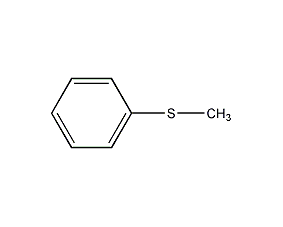
Structural formula
| Business number | 02JG |
|---|---|
| Molecular formula | C7H8S |
| Molecular weight | 124.21 |
| label |
Anisole sulfide, phenylthiomethane, anisulfide, Methyl phenyl sulfide, methylphenyl sulfide, thioanisole, Anisole sulfide/phenylthiomethane/anisole sulfide, phenyl methyl sulfide, (1-Thiaethyl)Benzene, (Methylsulfanyl)Benzene, (Methylthio)-Benzen, 1-Phenyl-1-Thiaethane, Anisole, Thio-, Methyl Phenyl Sulphide, Methylphdenylsulfide, Methylphenylthioether, aromatic sulfur compounds |
Numbering system
CAS number:100-68-5
MDL number:MFCD00008559
EINECS number:202-878-2
RTECS number:DA6200000
BRN number:1904179
PubChem ID:None
Physical property data
1. Properties: colorless liquid
2. Density (g/mL, 20℃): 1.0533
3. Relative vapor density (g/mL, air=1 ): Undetermined
4. Melting point (ºC): -15
5. Boiling point (ºC, normal pressure): 187-188
6. Boiling point (ºC, KPa): Undetermined
7. Refractive index: 1.5842
8. Flash point (ºC): 75
9. Specific rotation ( º): Not determined
10. Autoignition point or ignition temperature (ºC): Not determined
11. Vapor pressure (mmHg, ºC): Not determined
12. Saturated vapor pressure (kPa, ºC): Undetermined
13. Heat of combustion (KJ/mol): Undetermined
14. Critical temperature (ºC): Undetermined Determined
15. Critical pressure (KPa): Undetermined
16. Log value of oil-water (octanol/water) partition coefficient: Undetermined
17 . Explosion upper limit (%, V/V): Undetermined
18. Explosion lower limit (%, V/V): Undetermined
19. Solubility: Insoluble in water, Soluble in general organic solvents.
Toxicological data
Acute toxicity: oral LD50 in rats: 891 mg/kg; intravenous injection LD50 in mice: 56 mg/kg.
Ecological data
This substance is slightly harmful to water.
Molecular structure data
1. Molar refractive index: 39.39
2. Molar volume (cm3/mol): 120.1
3. Isotonic specific volume (90.2K ): 296.0
4. Surface tension (dyne/cm): 36.8
5. Dielectric constant:
6. Dipole moment (10-24cm3):
7. Polarizability: 15.61
Compute chemical data
1. Reference value for hydrophobic parameter calculation (XlogP): None
2. Number of hydrogen bond donors: 0
3. Number of hydrogen bond acceptors: 1
4. Number of rotatable chemical bonds: 1
5. Number of tautomers: none
6. Topological molecule polar surface area 25.3
7. Number of heavy atoms: 8
8. Surface charge: 0
9. Complexity: 55.4
10. Number of isotope atoms: 0
11. Determine the number of atomic stereocenters: 0
12. Uncertain number of atomic stereocenters: 0
13. Determine the number of chemical bond stereocenters: 0
14. Number of uncertain chemical bond stereocenters: 0
15. Number of covalent bond units: 1
Properties and stability
Avoid contact with oxidizing agents.
Storage method
Store in a cool, ventilated warehouse. Keep away from fire and heat sources. should be kept away from oxidizer, do not store together. Keep sealed. Use explosion-proof lighting and ventilation facilities. It is prohibited to use mechanical equipment and tools that are prone to sparks. The storage area should be equipped with emergency release equipment and suitable containment materials.
Synthesis method
1. It is obtained by using thiophenol and dimethyl sulfate as raw materials and carrying out esterification reaction under alkaline conditions.

2. Aniline method: Diazonium salt is prepared by diazotization of aniline; it is then reacted with sodium methylmercaptide. The final reaction formula is as follows:

Purpose
In medicine, it is used as a raw material for the synthesis of antibiotics and anti-ulcer drugs; in pesticides, it is used as a raw material for the synthesis of insecticides, fungicides, and herbicides; it is also used as a stabilizer for vitamin A and an antioxidant for aromatic amines. , lubricating additives, raw materials for spice synthesis, etc.

 微信扫一扫打赏
微信扫一扫打赏

